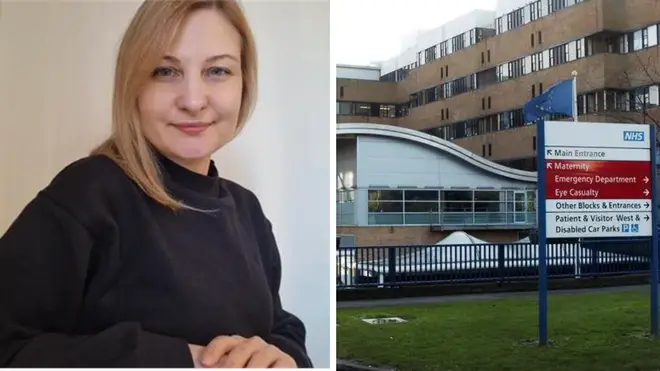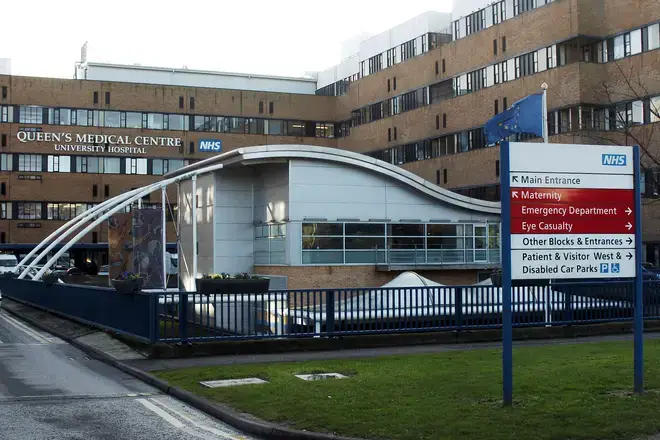
Ian Payne 4am - 7am
27 April 2024, 06:40

The twin of a woman who died after she was found collapsed under a coat at A&E has said her death could have been avoided if she was seen sooner.
Inga Rublite, 39, died after she was found collapsed under a coat in an A&E waiting room more than eight hours after she had arrived.
When the story was initially reported by LBC in February, staff at the A&E said they believed the long waiting times may have contributed to her death.
Now Ms Rublite’s twin sister Inese Briede, 39, has said her sister may not have died “if someone was just checking up on her”.
Read more: Mother, 39, collapsed under her coat and died after seven-hour wait at crowded A&E
Ms Rublite first attended A&E at Queen’s Medical Centre (QMC) in Nottingham in the late hours of January 19, complaining of a severe headache, dizziness, high blood pressure and vomiting.
Staff called her name seven hours after she had arrived, but when she didn’t respond, they discharged her believing she had gone home.
It wasn’t until over an hour later that it was discovered she had a seizure after falling asleep, and was then found unconscious under her coat.
She was transferred to intensive care, where it was discovered she had suffered a brain haemorrhage and had bleeding so severe it was inoperable.
She died on January 22.

Speaking about her sister’s death, Ms Briede, who lives in their home country of Latvia, said she believes her sister "basically died in that waiting room".
She told The Guardian: “That is the official date of death, but I think she basically died in that waiting room.
“No one was doing anything for her. And by the time they found her, it was too late".
The two sisters moved to the UK together in 2004 after finishing school.
Ms Briede moved back to Latvia in 2008, but her sister Ms Rublite remained in the UK after securing work in Nottingham.
She later went on to become a mother to two sons, aged 11 and 13, who are now cared for by their father.
Ms Briede continued: “She lived there [in the UK] for 20 years, she paid all the taxes, she worked hard and paid everything on time. She did everything right. Even that day when the headache came on, she stayed in work.
“In all those years, the one time she went to the hospital to ask for help, no one was looking at her. I can’t describe how that feels. That you can’t get help in the place where you’re supposed to go for help.”
Hours before Ms Rublite went to A&E she had called her sister during her lunch break at work complaining of a headache.
After her shift, she returned home where she slept for five hours, only to find her headache had worsened when she woken by a call from her sister.
She took her blood pressure, which came back 156, at which point her twin Ms Briede told her she needed to go to the hospital.
She called for an ambulance but was told none were available, so Ms Rublite asked her work colleague and next-door neighbour to drive her to the hospital as she was too unwell to do so herself.
Her neighbour Rasa Balzonyt described Ms Rublite as “fit and healthy”, but said on the journey to the hospital she had thrown up and complained of feeling dizzy.
Ms Balzonyt waited with her for two hours in A&E but returned home to take care of her son after they were told it would be a nine-hour wait before she was seen.
“No one saw her when I was there, her name was never called. I was getting so frustrated and angry,” Ms Balzonyt said.
“I left her in a safe space, I thought she would be fine. I thought the doctors would help her. It should have been the safest place. We didn’t realise how serious it was.”
Her sister Ms Briede repeatedly tried to get hold of her sister the next morning when a nurse eventually answered a FaceTime call at around 7am on her phone.
The nurse said someone needed to come to the hospital immediately as they had found her sister having a seizure.
Ms Briede said she was told by doctors on two occasions that her sister might have survived if she had been treated more quickly.
“I was told that this whole situation could have been avoided if someone had seen her, or if someone was just checking up on her. It’s so hard to know that there could really still be a person here if someone was doing their job,” she said.
She said she had sympathy for the staff at QMC when she visited the hospital the following day, adding she saw the overcrowded waiting room and knew it was “hard for them as well”.
But she continued: "This is not something you can just accept.
“How long is the hospital going to work like this? Because it has been like this for years. People are dying and everyone is just being quiet about it.”
Her sister’s death will be examined by a coroner at an inquest in July.
Dr Keith Girling, medical director at Nottingham University Hospitals NHS trust, which includes the QMC, said: “I offer my sincere condolences to the family at this difficult time. An investigation is now taking place and, until this has been concluded, we are unable to comment further.”